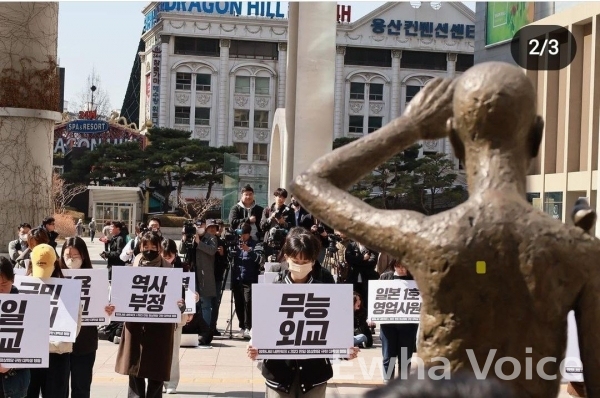
New agreements were reached upon the law in the requisition of labor during a summit between President Yoon Suk Yeol and his Japanese counterpart, Fumio Kishida, in Tokyo on March 10. These agreements came just 10 days after South Korea announced a deal with Japan to establish a Seoulbacked foundation to reimburse victims of wartime forced labor, a departure from the Supreme Court's 2018 ruling, which had ordered two Japanese companies to pay compensation. The March 10 summit and the earlier agreement between South Korea and Japan appear to have expressed hopes for a turning point in the two countries’ relations.
However, not everyone was satisfied with the outcome of these talks. Opposition has been raised by Peace Nabi, a nationwide university network club in South Korea, which maintains that the new law is unjust. “Forced labor victims are seeking both Japan’s apology and legal compensation,” a Peace Nabi member who wishes to remain anonymous said.
In support of their view, Peace Nabi pointed to past judgements on the two governments’ efforts to resolve the forced labor dispute. In 2018, the South Korean Supreme Court’s ruling on forced labor criticized the two governments for not taking the victims’ suffering seriously and not providing emotional compensation. However, the group stated that the current administration is not accepting the ruling and victims’ demands, but rather following Japan’s claim that there was no forced labor.
Yang Geum-deok, a victim of Japanese forced labor, has stated that she does not want such monetary indemnity. Furthermore, Peace Nabi claimed that President Yoon has shown an inexplicable attitude in reassuring the Japanese government on March 15 that there is no need to worry about changes to the forced labor law. The bill also proposed establishing a future youth fund for the development of both nations, but Peace Nabi members expressed their confusion, wondering why young people should receive such money. Peace Nabi stressed that ignoring the victims’ demands and the Supreme Court's ruling is unacceptable. Regarding the way of compensation, Peace Nabi also believes that Japan’s government and the offending companies should bear the responsibility for compensation.
“The new summit on Japan’s forced labor is a decision made by the current government as the best effort to establish the ties between Korea and Japan,” said Lee Myon Woo, a deputy director of the Sejong Institute.
However, Lee stated that there are concerns within the Japanese government about whether they can fully trust this decision in the face of antagonism within Korea. The Japanese government is also maintaining a position that prevents companies from participating in compensation for their use of forced labor.
“While there are limitations to the forced labor law, there are some areas that need to be addressed,” Lee said.
Lee stressed that the Japanese government’s basic stance is that the issue has already been resolved under the 1965 agreement; therefore, it is difficult for Japanese companies to be included in this recent measure. On the other hand, the forced labor victims and their support groups demand an apology from the Japanese government and the participation of the companies in the compensation process. As there are disagreements between the forced labor victims and the Japanese government, he worries that this may lead to ongoing opposition within Korea.
Lee pointed out that while the Japanese government may draw a line on the issue of forced labor, there is a possibility that Japanese companies may voluntarily participate in compensation due to Japan’s cultural aspect of saving face. Nevertheless, it is not easy for the Japanese government to suddenly change its stance. Lee stressed that it is necessary to consider the restoration of the relationship between Korea and Japan and the international status of Korea.
Indeed, while the matter remains domestically sensitive, the outcome of the summit was welcomed by allied nations and international organizations. Along with the United States, the European Union, and the United Nations have all expressed their support for the South Korean government’s announcement of the resolution of the Japanese forced labor issue.

